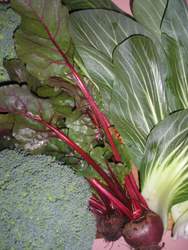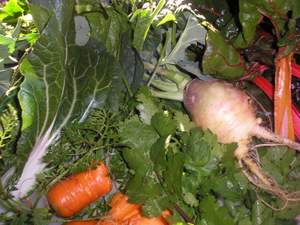|
Health Benefits of Organic FoodIs buying organic food worth it?
What are the health benefits of organic food? Is organic food really healthier for you? Is it worth the cost of buying organic food or growing your own? Yes. Here’s why. 
What you don’t get with your organic fruit and vegetables may be even more important that what you do get. Claims that eating organic is not healthier for you are often based solely on nutritional comparisons. You need to also consider the health benefits of avoiding the chemical residues that non-organic foods leave behind in your body. At the very least, eating organic food moves you from the category of taking uncertain risks with your health. Eating organic food:
Are you wasting your money buying organic food for yourself and your family?In summary, no, at the very least you are reducing the amount of toxins you put into your body in the form of pesticides and herbicides. The science is divided on whether you get increased nutritional value from organic food, but several reliable studies have concluded that you do get an increase in several key vitamins, minerals and antioxidants.
By purchasing organic food you are certainly benefiting the environment by supporting biodiversity and reducing the poisoning of soil and waterways. Eating organic food also means that you avoid the damaging effects of food additives such as artificial sweeteners, flavourings and colourings. Given the uncertain effects of genetically modified crops on human health it is also a bonus that organic food excludes GM crops. By eating organic food you can get more nutritional value for the money you spend. Organic food may be more expensive, but you have to eat less of it for the same nutritional impact. Grow your own organic food and it’s even better for you and the planet. Food is fresher and therefore has retained more nutrients and tastes better. Environmental impacts are reduced even further by cutting out the energy costs of transport, distribution and refrigeration. Importantly too, you become involved and knowledgeable about the food cycle and become a champion of the environment. How important is it to avoid pesticides in food?The full effects of pesticides (organophosphates) on the human body are not known, but it is known that pesticidal residues do accumulate in our bodies from eating non-organic food. Children in particular have a higher intake of pesticides per body weight, and their immature organs have a limited ability to detoxify. Pesticides have been linked to cancer, foetal abnormalities and reductions in fertility levels. The risk of pesticide consumption is also underestimated by ignoring the ‘cocktail effect’ of the mixture of chemicals in our bodies. A Soil Association report published in 2004 commented that: “Combinations of low-level insecticides, herbicides and nitrates have been shown to be toxic at levels that individual chemicals are not.” Whilst it’s an enormous task to assess all the possible combinations of chemicals we ingest, the simple fact is that the effects are unknown, and can be avoided by eating organic food. What are the nutritional differences between organic and non-organic fruits and vegetables?There have been many studies that report higher levels of vitamins, minerals and anti-oxidants in organic food. In researching the scientific studies that evaluate the food value of organic produce I found that many studies have been strongly criticised and have not been peer-reviewed. Enthusiasts of non-organic food use this as an argument to undermine the overall respectability of the organic food movement, and proceed to paint all studies with the same brush. Whilst the scientific methods of many of the studies can be legitimately challenged, there are still a number of legitimate, peer-reviewed studies that have found nutritional advantages to organic food. A study by Virginia Worthington into the Nutritional Quality of Organic Versus Conventional Fruits, Vegetables, and Grains, published in The Journal of Complimentary Medicine in 2001, concluded that organic foods contain higher levels of vitamin C, magnesium, iron and phosphorus. A summary of numerous studies comparing the nutritional benefits of organic and non-organic food can be found at the Organic Trade Association website. Criticisms of these studies are summarised by Joseph D. Rosen, Ph.D. in The Organic Food Nutrition Wars. Anti-oxidants are produced by plants when they’re attacked by diseases and pests. It’s logical that organic foods, unprotected by pesticides, will tend to produce more anti-oxidants that non-organic foods. A study by Danish researchers Brandt and Molgaard published in 2001 in the Journal of Science in Food and Agriculture found that organic vegetables and fruits most likely contain more many anti-oxidants than conventional ones, “allowing for the possibility that organic plant foods may in fact benefit human health more than corresponding conventional ones.” In my opinion, the nutritional debate over organic foods often completely misses the point when it ignores the environmental benefits of organic farming. Nutritional studies also ignore the negative impacts of pesticides and other toxic chemicals in non-organic food. Food additives and the health benefits of organic foodIs it important that organic food prohibits food additives? Organic food also prohibits the inclusion of food additives that are known to be damaging to health, such as artificial sweeteners, flavours and colourings and hydrogenated fats. These have been connected to a range of health problems including allergic reactions, heart disease and asthma. GM crops and the health benefits of organic foodIs it important that organic crops are non GM? The full impacts of genetically modified foods on human health and the environment are unknown. Organic foods are non-GM. Health and Organic FoodsThe full health benefits of organic food are yet to be discovered, but already scientists have provided enough research to support the validity of eating and growing organic food whenever possible. Back to Advantages of Organic Food from Health Benefits of Organic Food
Back to Healthy Eating Guide home from Health Benefits of Organic Food
|
Are you as healthy as you can be?
Take action to lift your energy and vitality levels beyond recognition.
Focus on
building healthy eating habits for just one month with
Veg Up and you’ll enjoy the effects for years. You will amaze yourself when you see how much more you can achieve.
More Growing Raw
Newsletter
Be sure to subscribe to "More Growing Raw" newsletter to receive monthly healthy eating tips, Growing Raw news and updates.
Most Popular Articles
- Green Smoothie Health
- Raw Food Health Levels
- Growing Vegetables in Containers
- Healthy Eating Plans
- List of Healthy Food to Always Eat Organic
- Growing a Vegetable Garden in a Polytunnel
- All Natural Detox Diet
Does your body need a fresh start?
Brighten up with all natural detox routines that give your body a cleansing push towards healthier patterns.
Learn how to
detoxify your body naturally. Your body is smart enough to clean itself without expensive detox pills and potions.









